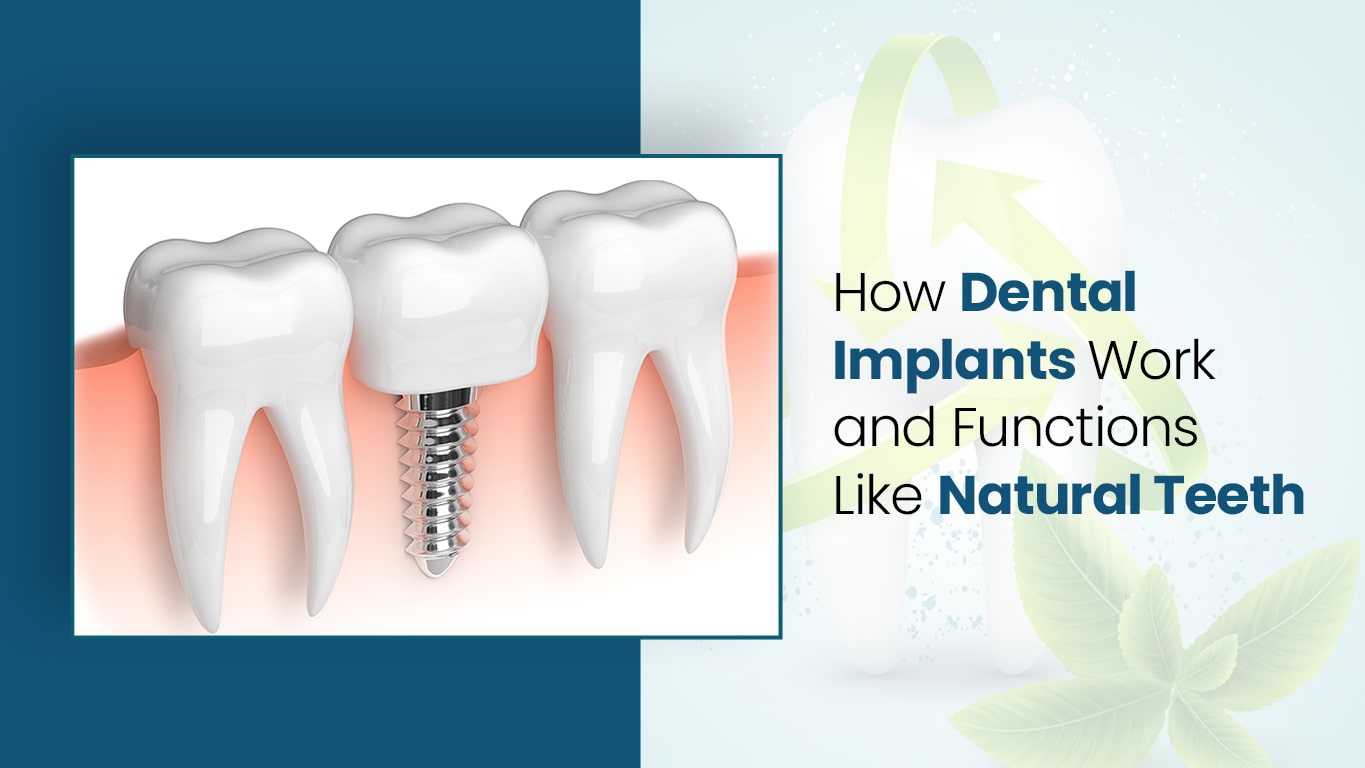If you have a missing tooth or teeth due to different reasons, such as dental trauma or tooth decay, getting a dental implant is the best way forward. Unlike other options such as bridges and dentures, dental implants will feel natural and functions just as real teeth. This article will discuss how dental implants work and function like natural teeth.
What are Dental Implants?
Dental implants are a teeth replacement option where small titanium posts are surgically inserted into the patient’s jawbone to serve as artificial tooth roots. Once in place, they let your dentist attach new replacement teeth (crowns, bridges, or dentures) directly onto them.
Dental implants are a popular as well as and effective way to replace missing teeth and provide a more permanent solution than other options like dentures or bridges. Plus, they help to keep your existing teeth healthy by preventing them from shifting out of place.
Am I a Candidate for Dental Implants?
If you are considering getting dental implants, you may be wondering if you’re a candidate. The best way to determine if they are right for you is to schedule a consultation with a qualified dentist or oral surgeon.
During your consultation, your dentist will thoroughly evaluate your mouth and teeth to ensure that you have enough bone support for dental implants. They will also assess your overall health to ensure that you do not have any conditions that could complicate the implant surgery or healing process.
Generally, most healthy adults who have lost one or even more teeth due to injury, disease, or decay are good candidates for dental implants. If you are not sure if implants are right for you, talk to your dentist about all of your options and what would work best for your individual situation.
How Dental Implants Work and Functions Like Natural Teeth
- Look Like Natural Teeth
Dental implants are made to look like natural teeth. They are usually made of porcelain or ceramic, which are materials that closely resemble the color of natural teeth. The shape and size of dental implants can also be customized to match the surrounding teeth. This means that once you have the dental restoration, no one can know that you have a dental implant.
- Function Like Natural Teeth
Dental implants are made in a way that they offer a foundation for replacement teeth which look, feel, as well as function like natural teeth. An implant is a titanium post (it looks like a tooth root) placed into the jawbone underneath the gum line. As the jawbone heals, it goes ahead to grow around the implanted post, anchoring it in a secure way in the jaw. The healing process usually takes between six and eight weeks. Once the implant has entirely bonded to the jawbone, a small connector post — called an abutment — is attached to the post to securely hold a new replacement tooth (crown).
This entire process is meant to make the implant function just as the natural teeth.
- Prevent Bone Loss
Dental implants are the only restoration option that actually prevents bone loss. When you lose one or many teeth, the bone that supports that tooth begins to dissolve away. This happens because the root is no longer stimulating the bone. Dental implants are inserted into the jawbone, just like a natural tooth root. This stimulation prevents bone loss and keeps your jaw healthy and strong.
- Keep the Adjacent Teeth Strong
One of the benefits of dental implants is that they help keep adjacent teeth stable. When a tooth is missing, the surrounding teeth can shift out of place, which can lead to a number of problems. Dental implants help prevent this from happening by providing support for the adjacent teeth.
- Prevents Facial Sagging
When you lose a tooth or teeth, you will begin to experience facial sagging as you age. This especially occurs around the jawline. Dental implants can help to prevent this facial sagging by providing support for the facial muscles and skin. The implants act as a scaffold for the overlying tissue, helping to keep everything tight and toned. This can give you a more youthful appearance and help you to avoid costly cosmetic procedures down the line.
- Durable Unlike Other Restoration Options
Dental implants are much more durable than other options for tooth replacement. They are made to last up to 15 years, with proper care, while other options may only last a few years. This makes dental implants a great investment for your long-term oral health.
How Much Does Dental Implants Cost?
There are several factors that affect the cost of dental implants, including the number of implants needed, the type of implant chosen, and the location of the dentist. Generally, however, dental implants can cost anywhere from $3700 to $4500 per tooth.
While this may seem like you’ll spend an arm and a leg upfront, it’s paramount to remember that dental implants are a lifetime investment. Unlike other replacement options, such as dentures or bridges, which will ultimately need to be replaced, dental implants can last years with proper care. This means that over time, dental implants actually end up costing less than other options.
If you’re considering dental implants but are worried about the cost, be sure to talk to your dentist about financing options. Many dentists offer flexible payment plans that can make dental implants more affordable.
Bottom Line
If you are considering dental implants, we hope this post has helped you understand the many benefits they offer and how they work and function just like natural teeth. In addition to improving your smile and boosting your confidence, dental implants can also help preserve your oral health and prevent future tooth loss. We encourage you to speak to your dentist on whether or not dental implants are best for you.
Visit us at Carrum Downs Dental Clinic for dental implants. Our dentist will examine your mouth and let you know if you are a perfect candidate for dental implants. If not, they will recommend proper corrective measures, such as bone grafting, to improve bone density before getting the implant.
Schedule an appointment with us today!


